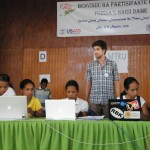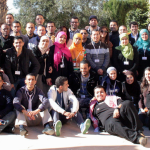International Women’s Day: Women Empowerment and Mainstreaming Gender Issues in Peacebuilding
In honor of International Women’s Day, we would like to introduce SFCG’s exciting new strategy for mainstreaming the issue of gender in peacebuilding in addition to providing short updates about a few of our ongoing projects that specifically focus on women’s empowerment.
Gender Mainstreaming:
At present, the Women, Peace, & Security team at Search is busy developing a gender mainstreaming strategy. Gender mainstreaming is the process by which an organization ensures that men and women’s gender-specific experiences and perspectives are taken into consideration at every level of its office operations and field programming. Because Search wants to incorporate this approach into all of its offices and programs world-wide, the development of an official gender mainstreaming strategy is expected to take a couple of years. However, the time spent developing this strategy will definitely be worth the effort. Search is hoping that the incorporation of this gender-sensitive approach will ultimately transform the way Search employees, and our partners, take gender into consideration in their daily lives, as well as the way in which they create peacebuilding programs in the field.
To kick this process off, Search is partnering with the Institute for Inclusive Security at the Hunt Alternatives Fund to produce a gender mainstreaming pilot project. There will be two phases to this program. First, Search and IIS will liaise with field office employees to develop a gender audit, so that Search can figure out what kind of gender issues are causing problems. Then Search plans to conduct a series of dialogues where office employees can elaborate on the audit findings. Search plans to use the information gleaned from the audit and dialogue exercises to create a curriculum, which other Search field offices can then use to increase gender sensitivity in their offices and field programs.
The Women, Peace, & Security team is excited to announce that the SFCG office in Nepal has been selected to host this pilot, and plans to get the project underway this month! As specifics get ironed out and put into action, the WPS team will make sure to keep everyone updated.
Women’s Empowerment:
SFCG has been working on women’s political and economic empowerment for many years. Currently, we are working on women’s leadership projects in Indonesia, Burundi and Tanzania, where our local staff are working with women parliamentarians to strengthen their skills in leadership and engagement with the media for advocacy and political action.
In Indonesia, we are working with the leading women’s advocacy organization in Indonesia, Koalisi Perempuan Indonesia (KPI, The Indonesian Women’s Coalition), in training national and provincial politicians. The project has created a forum where, for the first time, women politicians from across political party divides come together to discuss issues of common concern. You can see a brief clip of our work with the women parliamentarians in Indonesia here.
In addition, we are working to strengthen the capacity of KPI and Yayasan Jurnal Perempuan (YJP, Women’s Journal Foundation), while working with local media partners to develop and broadcast a radio drama and interactive radio talk shows that promote gender-sensitivity and women’s empowerment in the country.
In Burundi, we launched a new radio program entitled Umwanya Ni Rwawe (“It’s your time, it’s your opportunity”), focusing on women leaders in the public and private sectors at the local level. Umwanya Ni Rwawe is produced within the framework of SFCG’s larger project Nawe Arashoboye! (“Yes, She can too!”), implemented in partnership with UN WOMEN and local organizations Dushirehamwe and Solidarité des Femmes Parlementaires (SOFEPA). This larger program works with newly elected women and women leaders from both the private and public sectors to ensure that they are equipped with the necessary tools to play an active role in governance, and that their increased inclusion brings about concrete social change and gender equality in Burundi.
“After this training I am convinced that I will be a better leader. I also gained confidence in how I can better help the population that elected me.”
“As for how a leader should behave, I noticed there were still many things I did not know. I learned a lot and I will try not to make the same errors as before again.”
~Participants in a Nawe Arashoboye training
The final project we are highlighting today is in Zanzibar, a semi-autonomous state of Tanzania. This exciting project will also be engaging the male parliamentarians to encourage their support for women’s leadership. This project is just getting underway so stay tuned for updates!











